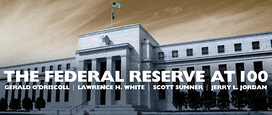Scott Sumner has written a thoughtful essay defending targeting nominal GDP (NDGP). As he notes, we agree on some issues and disagree on others. I will respond to a few points.
What I and others have defended was the classical gold standard adopted by the British after the Napoleonic Wars and by America practically in 1879 and officially in 1900. Other major countries adopted that standard at various times throughout the nineteenth century. A number of countries adopted it without having a central bank, e.g., Canada and the United States. To simplify somewhat, it was an automatic system for adjusting the demand for money to the supply of money and maintaining long-run prices nearly constant. (No system is truly automatic if human beings are involved.)
The post-World War I gold standard operated quite differently, and is known in the literature as a gold-exchange standard. Central banks economized on reserves and engaged in the sterilization of reserves that Sumner describes. Both systems (pre- and post-World War I) were called the gold standard, but they were in reality two different systems. Nineteenth century economists like David Ricardo understood the differences very well. Modern economists often conflate them. The global monetary system failed in the 1930s precisely because of the differences between the pre- and post-World War I “gold standards.”
Deficits in the 1960s and 1970s were perhaps modest compared to today, but the emergence of permanent peacetime deficits was a new phenomenon. The story is masterfully chronicled by James Buchanan and Richard Wagner in Democracy in Deficit: The Political Legacy of Lord Keynes. The Fed responded to the new fiscal regime by monetizing the deficits. Fed officials at the time acknowledged what they were doing. It was not a policy error. Politics certainly played a role. Fed Chairman Arthur Burns kept a diary, long secret but now published, of his service in the Nixon Administration. Burns consciously engineered an expansionary monetary policy to help re-elect Richard Nixon. We have it in his own words (Inside the Nixon Administration: The Secret Diary of Arthur Burns, 1969-74, ed. by Robert H. Ferrell). One could describe what Burns did in a variety of ways, not all of them flattering, but there was no policy error here. Nixon wanted “stimulus,” and Burns provided it. The Burns policy greatly contributed to the Great Inflation.
Given this record, I cannot agree that in the 1980s and 1990s “central banks were given greater independence, either tacitly or officially.” There were no official changes, certainly not for the Fed. What changed in many countries was the move away from chronic fiscal deficits. We now know how temporary that change was, and how illusory it was for a number of European countries. In our paper for the 2012 Cato Monetary Conference, “Federal Reserve Independence: Reality or Myth?”, Thomas Cargill and I argue at length against the idea that central banks are independent. The paper appears in the Cato Journal Volume 33 (Fall 2013).
Sumner questions the wisdom of “tamper proof” rules. It is not a phrase that I used, or that I would have chosen. But surely the system of liberalism and constitutional government is predicated on permanent rules. That is what is described in the phrase “the rule of law,” as opposed to the rule of men. I have argued that central banks should be governed by rules for the same reason that government officials generally should be so governed. The rule of law ensures that even evil men can do no great harm. The gold standard is one such rule. Especially as argued in Sumner’s posting for Cato Unbound, NGDP targeting seems too flexible for my taste. Jerry Jordan makes that point in his commentary.
My main question about NDGP targeting, which I have asked Sumner in other forums, is how is the rule going to be enforced? Rules are not generally self-enforcing. If Congress were to mandate some form of NGDP targeting, what incentives do Fed officials have to follow it? Will they lose their jobs if they deviate from the rule? Will their incomes fluctuate with fluctuations in the rate of growth or level of NGDP? (Ben McCallum has recently argued that the difference between rate and level targets is potentially very large.) Central bankers react to incentives, as do all human beings. What are the incentives in Sumner’s system?

